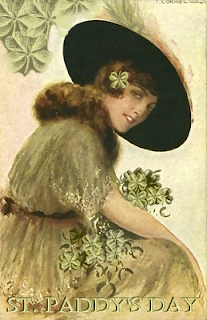My thoughts of the poem Pied Beauty this wonderful rainy day
Analysis of the poem "Pied Beauty" by Gerard Manley Hopkins
Gerald Manley Hopkins was a passionate Christian who lived during the Victorian era. During this time in history, Hopkins’s peers such as Charles Darwin were looking to nature for the answer to mankind’s questions of existence, meaning, and creation (Wikipedia, 2010, p.1). It is suggested in Hopkins’s poem “Pied Beauty” his fervent belief in an omnipotent Creator influenced him to challenge his peer’s view points about creation. Hopkins’s Poem is a wonderful challenge to the ideologies of his contemporaries. The line in the Poem, “Whatever is fickle, freckled, (Who knows how?)” may demonstrate this challenge (Kennedy, 2010, p.488).
“Pied Beauty” shows through the complexities of nature the existence of a Creator is evident. In the poem “Pied Beauty” Hopkins asserts mankind can have assurance in the unchanging nature of God despite; the ever changing complexities and contrasting differences in the natural universe. Mankind can praise God for His variegated creation, because through complexities and irregularities in nature, man comes to understand his Creator. Mankind is called back to prayer and worship through the revelation of the person of God through His creation.
This is demonstrated in the first and last line of the poem, which begins with “Glory be to God for dapple things” and ends with “praise him” suggesting “Pied Beauty” is a prayer” (Heller, 2010, p, 3).
During the Victorian era uniformity, efficiency, standardization, and natural selection were valued norms (Wikipedia, 2010, p.4). Hopkins may have used the literary devices of dichotomy and duality, in the poem “Pied Beauty” as a theological protest against these ideologies and values. The passion Hopkins has for the truths of the Bible is brought to illumination through his poetry. Hopkins a Bible scholar, makes his belief‘s known in the poem “Pied beauty”; God is the Creator of the universe and the beauty of world is a gift from Him (Wikipedia, 2010, p.1). Hopkins’s idea for his poem may have come from this verse in the Bible; “Every good and perfect gift if from above, coming down from the Father of the heavenly lights, who does not change like the shifting shadows” (James 1:17).
Hopkins uses the literary device of dichotomy to compare the unchanging character of God, to the ever-changing natural universe (The American heritage dictionary, 1973, p.366). By comparing these contradictory opinions of the Victorian era, the unchanging nature of God to the ever-changing world around him; the reader is forced to question the ideologies of Hopkins’s contemporaries. The use of dichotomy as a literary device in “Pied beauty” provides an educated argument for a Creator. If creation is the standardized, uniform, observable process suggested by Hopkins’s peers; how does creation come from such visible chaos of the natural world (Wikipedia, 2010, p.4)?
Hopkins may have used the literary device of duality to help the reader recognize the poem has much deeper meaning, then just the beauty of nature. Duality is a literary device used to demonstrate the dual nature of reality (The American heritage dictionary, 1973, p.402). The reality the author is trying to convey in “Pied Beauty” is an omnipotent Creator must be responsible for the creation of the natural universe and mankind; because the complexities and beauty of this universe could not be by chance. Hopkins further reinforces the complexities of this world using the literary tool simile; of comparing two unlike objects (The American heritage dictionary, 1973, p.1206) “skies of couple- color as a brinded cow “(Kennedy, 2010, p.488). This rich metaphor points out the deep intricacy of the world.
The author continues his reinforcement of the complexities of the natural universe by using the literary device paradox; by pointing out conflicting inconsistency of this natural world (The American heritage dictionary, 1973, p.950). In line nine of the poem, Hopkins use of paradox is demonstrated “swift, slow; sweet, sour; adazzle, dim” ” (Kennedy, 2010, p.488). The author suggests from the chaos in nature, the deep richness, intricacy, and complexities of this universe; could only be possible at the hands of an unchanging Creator. This belief of Hopkins’s is evident in stanza ten of “Pied Beauty” “He fathers-forth whose beauty is past change” (Kennedy, 2010, p.488). Through the depth and complexity of creation the poem suggest mankind can come to know the Creator, through the observation of the creation.
The poem “Pied Beauty’ written by Hopkins challenges the assertions of his contemporaries and attempts show through the complexities of nature the existence of a Creator is evident. Through the observation of nature, mankind comes to know the personality of his own Creator. Despite mankind living in a fallen world of irregularities, contradictions and inconsistency, the human race can be rest assured of the unfailing nature of God. Hope is given to this fallen world by the character of its Creator. The joyful passionate admiration of Hopkins for his Creator and his testimony was brilliantly given to the world in this beautiful poem.
Gerard Manley Hopkins (1844-1889)
Pied Beauty
Glory be to God for dappled things—
For skies of couple-colour as a brinded cow;
For rose-moles all in stipple upon trout that swim;
Fresh-firecoal chestnut-falls; finches' wings;
Landscape plotted and pieced—fold, fallow, and plough;
And áll trades, their gear and tackle and trim.
All things counter, original, spáre, strange;
Whatever is fickle, frecklèd (who knows how?)
With swíft, slów; sweet, sóur; adázzle, dím;
He fathers-forth whose beauty is pást change:
Práise hím.
Gerald Manley Hopkins was a passionate Christian who lived during the Victorian era. During this time in history, Hopkins’s peers such as Charles Darwin were looking to nature for the answer to mankind’s questions of existence, meaning, and creation (Wikipedia, 2010, p.1). It is suggested in Hopkins’s poem “Pied Beauty” his fervent belief in an omnipotent Creator influenced him to challenge his peer’s view points about creation. Hopkins’s Poem is a wonderful challenge to the ideologies of his contemporaries. The line in the Poem, “Whatever is fickle, freckled, (Who knows how?)” may demonstrate this challenge (Kennedy, 2010, p.488).
“Pied Beauty” shows through the complexities of nature the existence of a Creator is evident. In the poem “Pied Beauty” Hopkins asserts mankind can have assurance in the unchanging nature of God despite; the ever changing complexities and contrasting differences in the natural universe. Mankind can praise God for His variegated creation, because through complexities and irregularities in nature, man comes to understand his Creator. Mankind is called back to prayer and worship through the revelation of the person of God through His creation.
This is demonstrated in the first and last line of the poem, which begins with “Glory be to God for dapple things” and ends with “praise him” suggesting “Pied Beauty” is a prayer” (Heller, 2010, p, 3).
During the Victorian era uniformity, efficiency, standardization, and natural selection were valued norms (Wikipedia, 2010, p.4). Hopkins may have used the literary devices of dichotomy and duality, in the poem “Pied Beauty” as a theological protest against these ideologies and values. The passion Hopkins has for the truths of the Bible is brought to illumination through his poetry. Hopkins a Bible scholar, makes his belief‘s known in the poem “Pied beauty”; God is the Creator of the universe and the beauty of world is a gift from Him (Wikipedia, 2010, p.1). Hopkins’s idea for his poem may have come from this verse in the Bible; “Every good and perfect gift if from above, coming down from the Father of the heavenly lights, who does not change like the shifting shadows” (James 1:17).
Hopkins uses the literary device of dichotomy to compare the unchanging character of God, to the ever-changing natural universe (The American heritage dictionary, 1973, p.366). By comparing these contradictory opinions of the Victorian era, the unchanging nature of God to the ever-changing world around him; the reader is forced to question the ideologies of Hopkins’s contemporaries. The use of dichotomy as a literary device in “Pied beauty” provides an educated argument for a Creator. If creation is the standardized, uniform, observable process suggested by Hopkins’s peers; how does creation come from such visible chaos of the natural world (Wikipedia, 2010, p.4)?
Hopkins may have used the literary device of duality to help the reader recognize the poem has much deeper meaning, then just the beauty of nature. Duality is a literary device used to demonstrate the dual nature of reality (The American heritage dictionary, 1973, p.402). The reality the author is trying to convey in “Pied Beauty” is an omnipotent Creator must be responsible for the creation of the natural universe and mankind; because the complexities and beauty of this universe could not be by chance. Hopkins further reinforces the complexities of this world using the literary tool simile; of comparing two unlike objects (The American heritage dictionary, 1973, p.1206) “skies of couple- color as a brinded cow “(Kennedy, 2010, p.488). This rich metaphor points out the deep intricacy of the world.
The author continues his reinforcement of the complexities of the natural universe by using the literary device paradox; by pointing out conflicting inconsistency of this natural world (The American heritage dictionary, 1973, p.950). In line nine of the poem, Hopkins use of paradox is demonstrated “swift, slow; sweet, sour; adazzle, dim” ” (Kennedy, 2010, p.488). The author suggests from the chaos in nature, the deep richness, intricacy, and complexities of this universe; could only be possible at the hands of an unchanging Creator. This belief of Hopkins’s is evident in stanza ten of “Pied Beauty” “He fathers-forth whose beauty is past change” (Kennedy, 2010, p.488). Through the depth and complexity of creation the poem suggest mankind can come to know the Creator, through the observation of the creation.
The poem “Pied Beauty’ written by Hopkins challenges the assertions of his contemporaries and attempts show through the complexities of nature the existence of a Creator is evident. Through the observation of nature, mankind comes to know the personality of his own Creator. Despite mankind living in a fallen world of irregularities, contradictions and inconsistency, the human race can be rest assured of the unfailing nature of God. Hope is given to this fallen world by the character of its Creator. The joyful passionate admiration of Hopkins for his Creator and his testimony was brilliantly given to the world in this beautiful poem.
Gerard Manley Hopkins (1844-1889)
Pied Beauty
Glory be to God for dappled things—
For skies of couple-colour as a brinded cow;
For rose-moles all in stipple upon trout that swim;
Fresh-firecoal chestnut-falls; finches' wings;
Landscape plotted and pieced—fold, fallow, and plough;
And áll trades, their gear and tackle and trim.
All things counter, original, spáre, strange;
Whatever is fickle, frecklèd (who knows how?)
With swíft, slów; sweet, sóur; adázzle, dím;
He fathers-forth whose beauty is pást change:
Práise hím.


